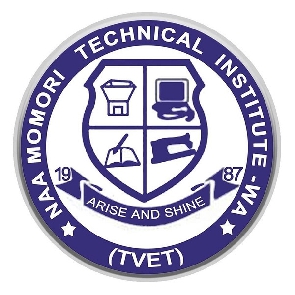Correspondence from Upper West
Technical and Vocational Education and Training (TVET) is widely regarded as the vital engine to the country's industrialization drive that has the potential to reverse the increasing graduate unemployment rate in the country when given the needed attention.
TVET usually imparts the trainers with learning and mastery of specialized techniques and scientific principles underlying those techniques.
To achieve this, educationists and labor experts believe the sector deserves huge investment to afford the youth with employable skills to increase livelihoods by establishing well-equipped TVET institutions across the country.
However, some of these existing technical and vocational institutions in the country offering training to the youth are often being left ill-equipped therefore affecting the effective running of the institutions.
One of these institutions is the Naa Momori Technical Institute
formerly known as Community Development located in the Wa Municipality of the Upper West Region.
Established in 1987 by Community Development and absorbed by the government not long ago, the institute trains students in courses such as: General Textiles; Electrical Engineering Technology; Fashion Design Technology; and Building and Construction Technology. Others are: Hospitality and Catering Management; Information Technology; Wood Construction Technology; as well as Cosmotology.
But despite running these important courses capable of insuring the trainees of a secured future, the institute is bedeviled with many challenges that are impeding its development.
According to our source in the school who prefers to remain anonymous, the school has no assembly hall compelling students to congregate in their dining hall, a structure that itself is not big enough to accommodate the over the 400-student body.
Apart from its limited capacity, the dining hall can only boast of tables in the hall without chairs for the students to sit to take their meals. As a result, they usually go out to have their meals after having been served their food due to the non-existence of chairs in the dining hall, the source indicated.
According to the source, the classroom desks and chairs are also inadequate and that as a result, some of them often fall on plastic chairs provided by the school who in that instant place their books on their laps to write.
The source also revealed the institute has no school bus for the transportation of students when the need arises.
In addition, some students who also preferred to hide their identities speaking to GhanaWeb indicated that the only rickety pickup vehicle of the Principal of the school that keeps visiting the mechanic shop every now and then, has compelled the school to acquire a tricycle (pragya, Mahama Camboo or yellow yellow) which the Principal now relies on for transportation.
According to them, the school is also without a well-equipped library as a classroom which was supposed to serve as a staff common room for teachers is what was being used as a makeshift library with just a few books being displayed on the shelves.
They however commended the school authorities on their ability to continue to work under such teething challenges calling on the government, philanthropists and non-governmental organizations to come to their aid to facilitate their learning.
Ghanaweb also learnt of how the school is again struggling to get the needed tools and equipment in training the students in their various courses as is peculiar with Technical and Vocational training institutions.
Despite this situation, however, the school is unable to internally generate funds to buy items and equipment needed for their training for fear of undermining the Free Senior High School policy.
Other challenges the students mentioned include: inadequate workshops, lack of tools and equipment, no vehicle for the day-to-day running of the institution, insufficient funds for training materials, lack of a sick bay, no training textbooks as well as zero staff accommodation for teachers.
When GhanaWeb tried to hear from Madam Sophia Wisah Mwengu, principal of the school, she declined to comment and said she needed to consult the management of the school before being able to do so.
But a further attempt to hear from the management of the institute as at the time of filing this report was unsuccessful.
Regional News of Friday, 21 April 2023
Source: www.ghanaweb.com

















